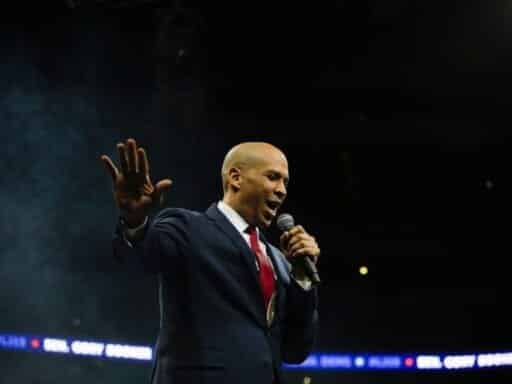Booker’s exit means a once diverse field is getting whiter.
Cory Booker spent the majority of his presidential campaign delivering an urgently upbeat message: That love could prevail and help heal a divided nation.
Ultimately, that strategy didn’t work; the New Jersey senator announced Monday he’s ending his campaign after consistently low numbers in national and early state polls. The exit of Booker, a prominent black candidate, is yet another sign that a once diverse field is getting whiter.
“It’s with a full heart that I share this news — I’ve made the decision to suspend my campaign for president,” Booker said in a statement to supporters Monday. “It was a difficult decision to make, but I got in this race to win, and I’ve always said I wouldn’t continue if there was no longer a path to victory.”
Booker noted that his campaign fundraising wasn’t able to keep up, in part because he failed to meet the polling and fundraising qualifications to get on debate stages and get the national exposure that brings.
“Our campaign has reached the point where we need more money to scale up and continue building a campaign that can win — money we don’t have, and money that is harder to raise because I won’t be on the next debate stage and because the urgent business of impeachment will rightly be keeping me in Washington,” Booker added.
Throughout the campaign, Booker focused on issues including curtailing mass incarceration, legalizing marijuana, and expanding economic opportunity for lower-income Americans. On the campaign trail, he would often point to legislation he has worked on in the Senate as proof of his commitment to these issues. For instance, last year, he introduced a Senate bill that would establish a three-year pilot program to test a job guarantee in areas of the US. The idea of a job guarantee program is gaining traction in the Democratic Party, but Booker’s bill so far is the only one in the Senate laying out steps to set one up, and it was a position that helped differentiate him from a crowded field.
Booker was a presence on the debate stage in the summer and fall, and in those performances, cast himself as a candidate more progressive than former Vice President Joe Biden, but more moderate than Sen. Elizabeth Warren. A last-minute fundraising appeal by his campaign in September saved his campaign from financial collapse and won him a spot in that month’s debate, but he didn’t meet the threshold to appear in the December or January debates, the months leading up to the all-important Iowa caucuses.
It remains to be seen what Booker does next, and if he will endorse another candidate. The senator from New Jersey could pursue reelection for his Senate seat in 2020.
Try as he might, Booker couldn’t catch on
Booker did a lot of things right, and still seemed not to go anywhere. He was viewed as a top contender early in the presidential race. His campaign spent time building a strong organizing operation in early states, and he racked up a long list of endorsements in Iowa and New Hampshire as well.
But in a huge crowd of Democratic candidates, the highest Booker polled throughout the campaign was 6 percent, according to the national RealClearPolitics average. He couldn’t rise above low single digits for months, despite being on the debate stage.
Booker’s departure means a historically diverse 2020 presidential field is now much less so. The top tier of candidates is comprised of former Vice President Joe Biden, Sens. Bernie Sanders and Elizabeth Warren, and South Bend, Indiana, Mayor Pete Buttigieg — all of whom are white.
Booker was one of two black candidates who ran for president, but both he and former candidate Sen. Kamala Harris largely failed to poll well among black voters in diverse early states like South Carolina and Nevada. Polling has shown black voters gravitating more toward Biden, Sanders, and Warren. Booker tried to argue that he was best qualified to build diverse coalitions within the Democratic Party, but the polls didn’t reflect any acceptance of that argument.
“The next leader of our party, and critically our country, must be someone who can build a diverse coalition and unite the progressive and moderate wings of our party in common cause to beat Trump and then heal our country,” Booker wrote in Essence magazine. “In a party and a country that is only becoming more diverse, the ability to build multi-racial, multi-ethnic coalitions is not a nice-to-have — it’s a job requirement.”
Despite being seen as a rising political star, 2020 ultimately was not Booker’s year.
Author: Ella Nilsen
Read More



